- Bernard Preston homepage
- Our green home
- Greens for Your Eyes Sake
Greens for your eyes' sake
Enjoy greens for your eyes' sake because, as always prevention by eating kale and spinach makes a lot more sense than trying to cure macular-degeneration and glaucoma with injections and lutein supplements.
More detail
I was astonished when my optician said to me, you enjoy a lot of greens, don't you?
How could he possibly have known? Continuing, he added, there was not a sign of a cataract, glaucoma or macular degeneration.
Lutein and zeaxanthin
That lead to some study and ultimately understanding that two phytonutrients, lutein and zeaxanthin are found in very high concentration in the eyes; they absorbe the damaging high-energy spectrum rays of radiation.

These carotenes are found in abundance in your greens; and in other fruit and vegetables. Zucchini squash has the benefit of being rich in both lutein and zeaxanthin. This simply emphasises the need to enjoy a broad spectrum of coloured foods.
It is estimated that five million Americans are needlessly blind because of a deficiency of these two carotenoids; and many more are partially-sighted. Swallow your greens and even if do not enjoy them, eat them; for your eyes' sake. Medicine never tasted this good.
Your greens of course are rich in many other important phytochemicals, minerals and vitamins. Just the folic acid for your children’s brains is a good enough reason to ensure they are daily on the menu; strong research shows the kids will perform better in school.
January is the season of high temperatures and humidity; that has meant that what we call spinach, Swiss chard in fact, has been decimated by moulds. Luckily the kale has proved more resistant and the lettuce is flourishing provided we water it daily in the heat. Fortunately with all the rain, the underground reservoir is full[2].

You have to cook imaginatively to enjoy kale; it has little flavour of its own. This is a wholesome quiche with a sourdough bread base, onions and feta cheese.
Why is kale so disliked?
Kale seems to be a little known green in South Africa. In fact it ranks right up there with broccoli and Swiss chard in the anti-inflammatory stakes; and the prevention of tumours.
And it is one of the richest sources of lutein, the stuff that prevents that age-onset macular degeneration[1]; but it is greatly disliked.
Kale is one of those vegetables which must be picked when still young and consumed on the day it was harvested; otherwise it's awful.
There are many varieties of kale; we grow several but I actually prefer the common one that grows quite tall. Unfortunately the iNdlazis also have discovered that it is the best green; they too instinctively know it is good for their eyes' sake. You may need to make a frame with bird-netting to protect your plants.
Late summer is the time to get the seed in the
ground for your winter vegetables; sow the kale exactly as you would spinach. They are both so simple to grow.
Holding the thick stalk, by running your fingers down the leaf you can strip off the edible part. I first fry a small onion in butter, we never eat margarine because of the hydrogenated fats, perhaps with garlic and chili and then drop in the sliced kale; often mixed with a few other greens such as Swiss chard and sweet basil. Add a few tablespoons of boiling water. Plop an egg on this base for the famous Florentine dish.
I admit to being a bit of a fruitcake; most days we have eggs Hilton for breakfast, a lettuce salad for lunch and kale for supper. I do not fancy someone poking me in the eye with a laser or sharp scalpel. Glaucoma.org states that lutein and zeaxanthin are also important in the prevention and treatment of pressure in the vitreous humor.

Dopamine for the eyes too
Scientists have discovered that those who are taking L-dopa medication for Parkinson's Disease are less likely to suffer from wet macular degeneration[3]; but it also induces unpleasant dyskinesias.
Consuming broad beans regularly for your eyes' sake, the only natural source of pharmaceutical quantities of L-dopa also makes a lot of sense. When sprouted they contain twenty times as much of the "happy hormone."

Greens for your eyes' sake
Eat greens for your eyes' sake whether you like them or not; you may go blind and suffer from cataracts otherwise. Read more about the lutein benefit.
useful links
When browsing use right click and "Open Link in New Tab" or you may get a bad gateway signal.
Newsletter
Our newsletter is entitled "create a cyan zone" at your home, preserving both yourself and Mother Earth for future generations; and the family too, of course. We promise not to spam you with daily emails promoting various products. You may get an occasional nudge to buy one of my books.
Here are the back issues.
- Lifestyle and ideal body weight
- What are ultra-processed foods?
- Investing in long-term health
- Diseases from plastic exposure
- Intensive lifestyle management for obesity has limited value
- A world largely devoid of Parkinson's Disease
- The impact of friendly bacteria in the tum on the prevention of cancer
- There's a hole in the bucket
- Everyone is talking about weight loss drugs
- Pull the sweet tooth
- If you suffer from heartburn plant a susu
- Refined maize meal and stunting
- Should agriculture and industry get priority for water and electricity?
- Nature is calling
- Mill your own flour
- Bake your own sourdough bread
- Microplastics from our water
- Alternative types of water storage
- Wear your clothes out
- Comfort foods
- Create a bee-friendly environment
- Go to bed slightly hungry
- Keep bees
- Blue zone folk are religious
- Reduce plastic waste
- Family is important
- What can go in compost?
- Grow broad beans for longevity
- Harvest and store sunshine
- Blue zone exercise
- Harvest and store your rainwater
- Create a cyan zone at your home
Did you find this page interesting? How about forwarding it to a friendly book or food junkie? Better still, a social media tick would help.
- Bernard Preston homepage
- Our green home
- Greens for Your Eyes Sake
Address:
56 Groenekloof Rd,
Hilton, KZN
South Africa
Website:
https://www.bernard-preston.com